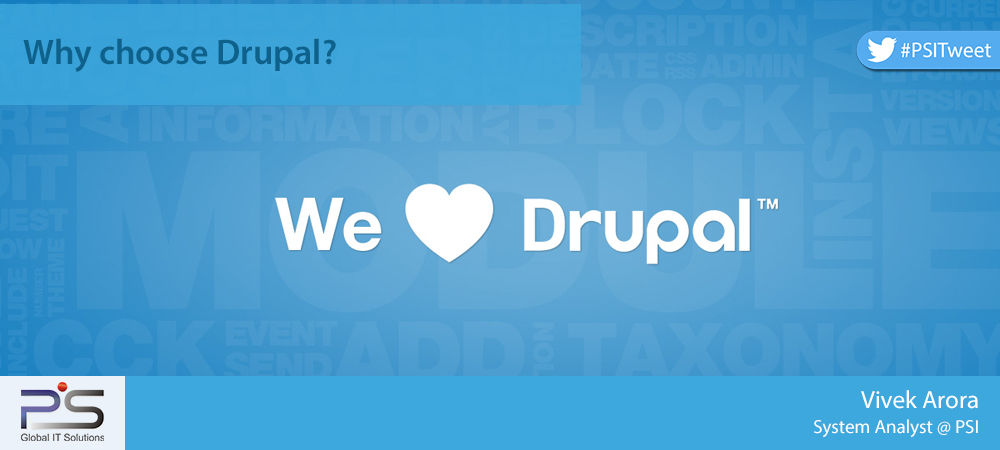
For nearly two decades, Drupal has been the preferred CMS tool for Enterprise Level Systems and Intranet Applications. Scalability, Flexibility, Ease of use, no licensing cost, enhanced features, global acceptability, etc. all these encapsulate the reasons for the popularity of Drupal amongst the Content Management Systems (CMS) available online. Drupal, WordPress, and Joomla are all built on PHP +MySQL and are Open-source platforms.
Since its release in 2001, Drupal has been downloaded over 15 million times and is the most acclaimed Open-source platform globally for developing a website. Its eighth full release, Drupal core is currently downloaded about 200,000 times per month from Drupal.org.
Drupal is a leading Open-source content management system for developing flexible and robust websites, specifically social media networks and applications. With over 15,000 modules, Drupal is considered the best CMS tool to create blogs, forums, e-commerce, CRM, intranets, social networks, news aggregators, wikis, photo galleries, restaurant review sites, and so on.
What Is The Reason Behind Drupal’s Popularity?

Drupal has been adopted by tens of thousands of websites, from individual blogs to massive social media networks. It is also considered to be a mature product with a huge developer community and support.
Drupal is being used by the world’s biggest & known brands, organizations, and even countries for highly complex websites that have to deal with the massive visitor traffic. Some of the companies using Drupal for CMS include Google, Yahoo, AOL, Sony/BMG, Universal Music Group, MTV, Nike, FedEx, Novell, Disney, etc.
Here are some of the primary reasons for Drupal’s wide-scale popularity:
1. Drupal is highly Flexible and Customizable
Enterprise content strategies are based on end-user experiences and responses. As such, there is no one size fits all model or framework for content management. The Hook terminology makes Drupal highly flexible and customizable. Drupal makes it easier to:
- Integrate change requests.
- Analyze user behavior and response.
- Extend and customize the existing core functionalities by creating custom modules.
2. Drupal for an Agile Methodology
Old traditional website development involves masses of documentation, and the client can view it only after weeks or months of development taking place. On the other hand, Drupal enables you to work in a true ‘Web 2.0′ style in which core features and functionality can be rapidly deployed with iterative enhancements and customizations done over time.
Feature module gives functionality to export views, pages, and content type into modules. It helps in updating the production environment from the development environment.
3. Drupal Security
When compared to WordPress and Joomla, Drupal offers a higher level of security which is the reason why the White House, the New Zealand Government and other public bodies use Drupal for CMS.

Drupal has a dedicated team to deal with security-specific issues. This team is responsible for identifying reported issues, patching th-ese issues, and notifying the community when there’s something to watch out for. Drupal’s core code has been proven to prevent common security problems such as those defined by the Open Web Application Security Project (OWASP). Additionally, the thriving development community has entire forums dedicated to delivering the best security strategies for each system. If the United States Government trusts Drupal, it’s evident that anybody else can.
4. Drupal Performance
Drupal comes loaded with extensive features for 360-degree optimization of the website. It is the best platform for website performance monitoring and optimization. Web pages in Drupal load much faster and have better response time too. Overall, Drupal CMS helps websites improve user experience, retention, and conversion rates.
5. Drupal Scalability
Scalability is another reason that makes Drupal one of the favorites among website developers. One can add as many pages to the website as needed without making any significant changes to the code. In fact, in most cases, new web pages can be added without changing a single line of code. Moreover, website owners can upscale, or downscale web page counts depending on website traffic.
The above reasons make Drupal the first choice for web development. Its manageability, security, and interoperability make it one of the best enterprise-class software. Further easy integration with third-party apps, mobile and search-engine friendly architecture makes it the number one platform for creating feature-rich, high-quality enterprise websites. However, the learning curve is stiff in Drupal, and website development requires considerable experience. At PSI, we have some of the best and highly experienced Drupal developers. Our custom web application development solutions have helped enterprises to leverage their online presence in time. Our solutions promise incremental value and ROI to our customers.Scalability, Flexibility, Ease of use, no licensing cost, rich on features, global acceptability all in all encapsulates the reasons for popularity of Drupal amongst the Content Management Systems (CMS) available online. Drupal, WordPress and Joomla are all built on PHP +MySQL and are Open-source platforms.
Released in the year 2001, Drupal is the most acclaimed Open-source platform globally for developing website. Its eighth full release, Drupal core is currently downloaded about 200,000 times per month from Drupal.org.
Drupal is known for being developer-friendly, powerful. Some powerful websites globally developed on Drupal are Whitehouse.gov and Data.gov.uk.
Drupal is a leading Open-source content management system for developing flexible and robust websites, specifically social media networks and applications. With over 15,000 modules, Drupal is considered the best CMS tool to create blogs, forums, e-commerce, CRM, intranets, social networks, news aggregators, wikis, photo galleries, restaurant review sites, and so on.
Drupal has been adopted by tens of thousands of websites, from individual blogs to massive social media networks. It is also considered to be a mature product with a huge developer user base.
Drupal being used by the world’s biggest brands
Drupal being used by the world’s biggest & known brands, organizations and even countries for highly complex websites that cope with massive chunks of visitor traffic. Some listed here are White house, The United Nations, Google, Yahoo, AOL, Sony/BMG, Universal Music Group, Warner Bros Music, Adobe, Harvard University, MTV, Nike, Amnesty International, Greenpeace, FedEx, Novell, Disney, The Kingdom of Belgium, Sun Microsystems, the New Zealand Government and Metallica.
Drupal is highly flexible and customizable
Hook terminology makes Drupal highly flexible and customizable, we can easily extend and customize the existing core functionalities by creating our own modules.
Drupal fits best for an agile development methodology
Old traditional website development involves masses of documentation and the client is able to view it only after weeks or months of development taking place. On the other hand, Drupal enables you to work in a true ‘Web 2.0′ style in which core features and functionality can be rapidly deployed to market, with iterative enhancements and customizations done over time.
Feature module gives functionality to export views, pages, content type into modules, which can be installed. It helps in updating production environment from development environment.
Drupal Security
Whitehouse website was built using Drupal. Drupal has a dedicated team to deal with security specific issues. This team is responsible for identifying reported issues, patching these issues, and notifying the community when there’s something to watch out for. Drupal’s core code has been proven to prevent common security problems such as those defined by the Open Web Application Security Project (OWASP). Additionally, the thriving development community has entire forums dedicated to delivering the best security strategies for each system. If the United States Government trusts Drupal, it’s evident that anybody else can too.
Vivek Arora is a System Analyst @ PSI[:]








